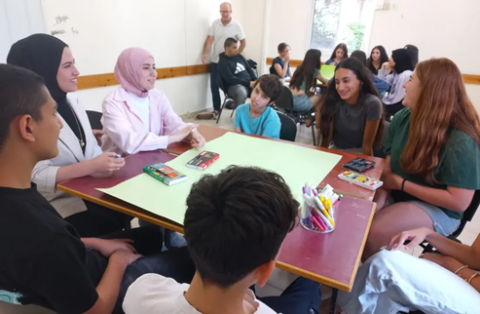Israel needs a reimagined educational system
This day of mourning is not only about what was lost; it is a call to take responsibility for the state of our society and to recommit ourselves to rebuilding it with greater wisdom and care.
In the shadow of recent events – the judicial reform crisis, the horrors of October 7, and the continuing war, Israeli society finds itself at a dangerous crossroads. There is a growing sense that the moral and democratic foundations of the state are under threat. At the same time, this is a moment rich with potential to reimagine Jewish identity, to renew a shared civic culture, and to reshape education as the most powerful tool for national repair.
This is not a theoretical challenge. For more than two years, Israel has been governed by a coalition that has deepened divisions, eroded liberal values, and neglected the delicate balance between Jewish tradition and democratic principles. The cost is already visible in social polarization, educational fragmentation, and a generation of young Israelis growing up in a country unsure of its identity.
The Hebrew state education system must now awaken to its historic responsibility. It must renew its commitment to the values enshrined in Israel’s Declaration of Independence: a Jewish and democratic state rooted in equality, justice, and cultural openness. Without such a realignment, the Zionist vision itself is at risk of collapse.
Fortunately, the desire for change is not confined to one political or religious camp. Across Israeli society, including in modern Orthodox, traditional, and even ultra-Orthodox communities, there is a growing thirst for a more nuanced, inclusive approach to Jewish identity. The old dichotomies of “religious vs secular” that once dominated public discourse are no longer relevant. They obscure more than they illuminate. Israelis today are seeking meaning, community, and purpose beyond labels.
The role of education in the new Israel
This is where education must lead. If we are to rebuild a society that can hold both Jewish tradition and democratic values, we must start with our children. Education must equip them with the knowledge, as well as with the emotional, ethical, and civic tools to live together in a pluralistic society. Schools must become spaces where disagreement is taught as a value, not a threat, and where empathy and curiosity replace suspicion and fear.
To do this, we need a new kind of educator. We must cultivate a generation of teachers who are not just transmitters of information but moral and spiritual leaders. These educators must be fluent in Jewish texts and traditions, committed to democratic principles, and capable of engaging students across ideological, religious, and cultural divides.
To achieve this, I propose the creation of a national beit midrash (study hall) for educational leadership – a sacred space where educators are trained in both pedagogical excellence and ethical vision. This institution would not only teach a curriculum but also cultivate wisdom, emotional intelligence, and a deep understanding of the complexities of Israeli identity. Its graduates would be equipped to lead school communities in conversations about Jewish renewal, civic responsibility, social justice, and human dignity.
We have seen hints of this vision before. Initiatives such as the TALI Foundation, the Shenhar Committee, and other programs have tried to integrate Jewish studies and democratic education. But what has been missing is a comprehensive framework, a bold and inspiring vision that positions Jewish-democratic identity as a way of life, not just a subject in school.
This is more urgent now than ever. Our young people are growing up in a fractured society where the boundaries between truth and falsehood and values and slogans are increasingly blurred. They are shaped by social media and public discourse, which often reward cynicism over curiosity and tribalism over empathy. Without intentional, values-based education, we risk raising a generation that lacks the tools to repair what has been broken.
It has been 77 years since David Ben-Gurion declared the founding of the State of Israel and defined it as both Jewish and democratic. It is the responsibility of our educational system to make that declaration come alive for today’s youth, not as a historical relic, but as a living challenge. To do so, we must teach students how to disagree respectfully, live alongside those different from them, and build shared spaces rooted in mutual responsibility.
This is not just the work of schools. Community centers, youth movements, welfare services, and even the army must be enlisted as part of a broader civic-educational movement. Together, these institutions can cultivate a new generation of engaged citizens who are proud of their heritage, committed to democracy, and capable of building bridges between fragmented communities.
A reimagined educational leadership would also be charged with nurturing relationships with Jews in the Diaspora, deepening engagement with non-Jewish communities in Israel, and promoting gender equality, environmental responsibility, and moral clarity grounded in the prophetic tradition. These are not “extras”; they are central to what it means to be a Jewish and democratic society in the 21st century.
In the spirit of Rabbi Kook’s teaching, “The old shall be renewed, and the new shall be sanctified,” we must reclaim the richness of Jewish tradition and breathe new life into it through creativity, dialogue, and shared purpose. As we mark Tisha B’Av this year, let us mourn not only the destruction of stone but also the crumbling of solidarity and shared meaning. Let us also pray, not only for the return of the kidnapped, the healing of the wounded, and an end to the war, but for a future of hope and wholeness.
Let our prayer be for a rebuilt society, one grounded in sacred education, civic responsibility, and the unshakable belief that we can live together in dignity and peace.
Ofek Meir

